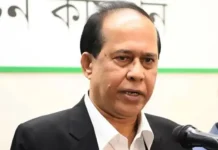Faruque Ahmed
With an ominous sign of destroying the opposition, the country’s politics entered yet another repulsive phase with the ruling party coaxing mid-level BNP and Jamaat men to join Awami League to make the government free from any formidable challenge.
Shifting party allegiance has come to the centre in recent months following BNP-led 20-party alliance’s failure to bring down the government through countrywide blockade and hartals from January to March this year.
The government marginally survived through excessive police power and arbitrary use of fire arms and filing fabricated cases against the opposition activists, but it was also able to get message of the opposition strength at the same time to decide that destroying the opposition must be the first thing it should do to eliminate the risk.
This ugly phase in politics by securing shifting of allegiance of locally capable opposition men to the ruling party has now become a frequent public event in the districts and Upazilas, while important senior BNP leaders remain in jail or in the run.
There is no democratic environment and the rule of law to protect opposition politics. The ruling party leaders are at work to wipe out dissent views from politics to give critics nno space to challenge the government.
Its major target is therefore to destroy BNP and Jamaat from active politics. BNP leader Begum Khaeda Zia postponed her visit to Saudi Arabia on May 8 for Umrah reportedly fearing arrest of some of her entourage members at the airport and possible denial of her entry back to the country.
The government is also setting up Special Tribunal to try her and other party leaders and workers on charges of arson and violence in the streets during the blockade programmes when people were burnt to death in buses and public properties were destroyed in cities and highways.
BNP chief has however blamed Awami League workers for triggering violence and arson on buses saying they did it to give a bad name to the opposition blockade to malign it in public eyes.
Meanwhile, the new move to break the opposition is picking up fast. There is also some indiscrete indication that the government is planning early election and to make it free of any strong challenge from the opposition; and new plan is also at work to accelerate prosecution of BNP leaders to knock them out of electoral race.
Information Minister Hasanul Haque Inu made it clear recently when he said Begum Zia will not get chance for electioneering next time. What he did not say is that the election may be announced at a convenient time keeping the opposition unprepared or when it is almost rooted out from the political scene. The ruling party’s move to knock out BNP and Jamaat is therefore hastily at work. Two convicted Jamaat leaders were already executed on war crime charges and several more may follow suit. But it is almost clear that the prosecution of Jamaat men has link to domestic politics.
Meanwhile, BNP is also landing into more troubled water on many fronts. Reports said eight party leaders along with more than 1,000 BNP-Jamaat men joined the ruling party in Comilla on April 15 handing over floral wreaths to Planning Minister AHM Mustafa Kamal.
In Joypurhat’s Panchbibi, around 500 BNP-Jamaat men joined the ruling party on June 6. District AL President and party MP Shamsul Alam Dudu was present on the occasion.
In Rajshahi, Mokhlesur Rahman, organising secretary of Jatiyatabadi Krishak Dal, joined the Awami League on July 2 with some 200 local BNP men. He is accused in three cases, including setting a police station on fire during the blockade programme. Earlier in May, BNP leader Habibur Rahman, a councillor of Rajshahi City Corporation changed his loyalty to Awami League a few days after his release from prison.
Salamat Ali, joint secretary of Chittagong’s Rauzan upazila BNP, is the latest to take shelter in the ruling party. He joined the ruling party on Monday last hours after his release from police custody. Salamat, an accused if killing a Jubo League activist in the locality.
He handed over a floral wreath to the president of Upazila Awami League president and he was pronounced an Awami League man overnight. Local ruling party leaders denied of any knowledge that he is an accused of killing a party worker along with several other cases.
They said if he is really accused in such cases, law would take its own course. His joining the Awami League and the pending cases are separate matters. Reports said Salmat Ali was going to an Iftar party of BNP north city unit when he was arrested. But in the next morning he was released.
Officers in Rauzan Police Station said he was indeed arrested but since his case was locally settled, so he was set free. Ruling party sources said there was no pressure on him to join, he joined on his own will.
Many of these BNP and Jamaat men stand accused in cases, mostly over violence. And those who have no cases against them face harassment by law enforcement agencies just because of their political identities.
Jamaat leader Afzal Hossain Pintu, a councillor of Chapainawabganj municipality is an accused in about a dozen cases. He joined the ruling party on May 12 and he is now safe from court hassles. Reports said more than a thousand leaders and activists of BNP and Jamaat in the district followed in his footstep. Hundreds of BNP and Jamaat men joined the Awami League in Natore, Sirajganj and over a dozen other districts only to save them from police cases. Many party leaders and workers are also frustrated with the poor state of the BNP and Jamaat and they feel secured in changing the side.
Even many Awami Leaguers are opposed to mass exodus from the opposition to the ruling party which is going to destroy the character of party politics. “They are joining our party for their protection and I don’t support this. Awami League will have to pay for this,” Chapainawabganj district AL president said commenting on conversion of the opposition leaders and workers to the ruling Awami League.
Source: Weekly Holiday









